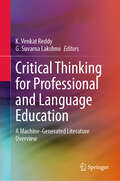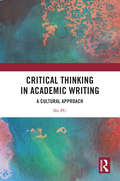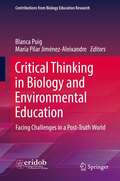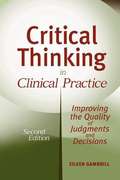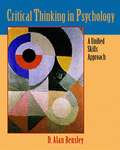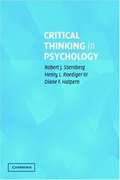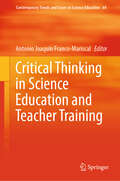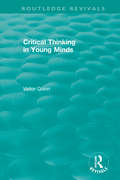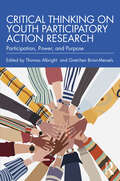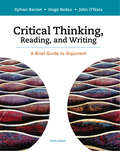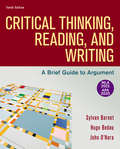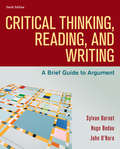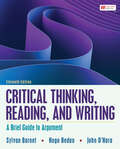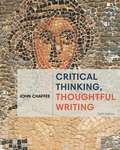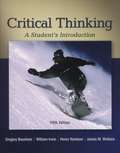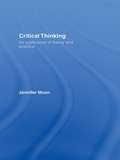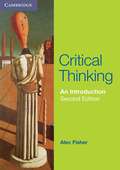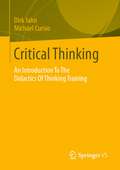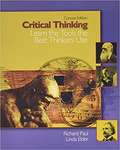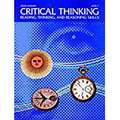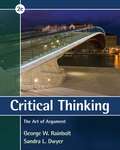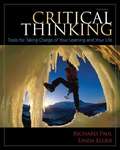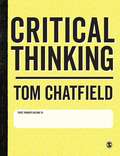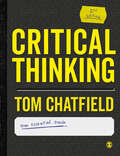- Table View
- List View
Critical Thinking for Professional and Language Education: A Machine-Generated Literature Overview
by K. Venkat Reddy G. Suvarna LakshmiThis book is the result of a collaboration between a human editor and an artificial intelligence algorithm to create a machine-generated literature overview of research articles analyzing importance of critical thinking in Educational Settings. It’s a new publication format in which state-of-the-art computer algorithms are applied to select the most relevant articles published in Springer Nature journals and create machine-generated literature reviews by arranging the selected articles in a topical order and creating short summaries of these articles. This book is a comprehensive guide to critical thinking research in education. It explores different definitions of critical thinking and its importance in specialized fields like business, engineering, and science. Presenting research on assessment, this resource delves into the integration of ICT tools for teaching critical thinking. With practical tools, strategies and tasks to develop critical thinking skills, thisbook is intended for researchers, educators, and those seeking to improve their critical thinking abilities.
Critical Thinking in Academic Writing: A Cultural Approach
by Shi PuThe book inquires into critical thinking through a cultural approach. Based on an 8-month ethnographic study, it compares Chinese postgraduate students’ conceptualisations and applications of critical thinking in three different settings in China and the UK. From an insider’s perspective, it analyses the intricate interplay of multiple cultural and individual factors that conditions students’ critical thinking development as they learn to write an academic thesis and to manage postgraduate learning. The book offers insights into the nature of problems that Chinese students encounter with critical thinking and envisions possibilities for the ideas for critical thinking to have a transformative power in an intercultural space. The book will primarily be of interest to academics and educators who work on critical thinking and academic writing, especially those who work with Chinese students. Scholars interested in intercultural issues in higher education may also find it relevant.
Critical Thinking in Biology and Environmental Education: Facing Challenges in a Post-Truth World (Contributions from Biology Education Research)
by Blanca Puig María Pilar Jiménez-AleixandreThis volume seeks to broaden current ideas about the role of critical thinking (CT) in biology and environmental education considering educational challenges in the post-truth era. The chapters are distributed into three sections, perspectives of a theoretical character (part I), empirical research about CT in the context of biology and health education (part II), and empirical research on CT in the context of environmental and sustainability education (part III). The volume includes studies reporting students’ engagement in the practice of critical thinking, and displays how CT can be integrated in biology and environmental education and why biology and environmental issues are privileged contexts for the development of CT. The chapters examine a range of dimensions of CT, such as skills, dispositions, emotions, agency, open-mindedness, or personal epistemologies. In addition, they explore topics such as climate change, sustainable diets, genetically modified food, vaccination, acceptance of evolution, homeopathy, and gene cloning. Concluding remarks regarding the connections between the chapters and future directions for the integration of critical thinking in biology and environmental education are presented in a final chapter.
Critical Thinking in Clinical Practice: Improving the Quality of Judgments and Decisions (2nd edition)
by Eileen GambrillDecisions are influenced by a variety of fallacies and biases that we can learn how to avoid. Critical thinking values, knowledge, and skills, therefore, are integral to evidence-based practice. These emphasize the importance of recognizing ignorance as well as knowledge and the vital role of criticism in discovering how to make better decisions. This book is for clinicians--clinicians who are willing to say "I don't know. " Critical Thinking in Clinical Practice, Second Edition is designed to enhance readers' skills in making well-informed, ethical decisions. Making such decisions is no easy task. Decisions are made in uncertain, changing environments with time pressures. Interested parties, such as the pharmaceutical industry, spend millions of dollars to influence decisions made. Drawing on a wide range of related literature, this book describes common pitfalls in clinical reasoning as well as strategies for avoiding them--sometimes called mind-tools. Mental health and allied professionals will come away from this text with knowledge of how classification decisions, a focus on pathology, and reliance on popularity can cause errors. Hazards involved in data collection and team decision making such as groupthink are discussed. Part 1 provides an overview of the context in which clinicians make decisions. Part 2 describes common sources of error, and Part 3 describes decision aids including the process of evidence-based practice. Part 4 describes the application of related content to different helping phases including assessment, intervention, and evaluation. Part 5 suggests obstacles to making well-informed decisions and how to encourage lifelong learning. This new Second Edition has been completely updated with expanded coverage on: * Evidence-based practice * Screening issues and practice errors * Lifelong learning * Problem solving * Decision making An interactive, dynamic book filled with insightful examples, useful lists and guidelines, and exercises geared to encourage critical thinking, Critical Thinking in Clinical Practice, Second Edition provides an essential resource for helping professionals and students.
Critical Thinking in Psychology
by D. Alan BensleyThis book was written for students and instructors who are serious about the improvement of critical thinking
Critical Thinking in Psychology
by Robert J. Sternberg Diane F. Halpern Henry L. RoedigerGood scientific research depends on critical thinking at least as much as factual knowledge; psychology is no exception to this rule. And yet, despite the importance of critical thinking, psychology students are rarely taught how to think critically about the theories, methods, and concepts they must use. This book shows students and researchers how to think critically about key topics such as experimental research, statistical inference, case studies, logical fallacies, and ethical judgments.
Critical Thinking in Science Education and Teacher Training (Contemporary Trends and Issues in Science Education #2)
by Antonio Joaquín Franco-MariscalThis edited volume explores the challenge of fostering critical thinking (CT) skills in science education, presenting the ENCIC-CT model as a framework for development. Named after the Science Education and Competences (Enseñanza de las Ciencias y Competencias, ENCIC) research group at the University of Malaga, Spain, this model emphasizes cultivating CT through socio-scientific issues and daily-life problems. It includes three key domains: knowledge, skills, and dispositions, each encompassing various dimensions addressed through scientific practices like argumentation, inquiry, and modeling. Teaching strategies such as gamification, role-playing, micro-debates, augmented reality, controversy mapping, and digital storytelling are highlighted. Spanning theoretical perspectives and practical experiences from early childhood to higher education, this book consolidates findings from the Spanish R&D project, “Citizens with Critical Thinking: A Challenge for Teachers in Science Education.” It is an essential resource for educators, researchers, and practitioners, offering valuable insights and practical applications for all educational levels.
Critical Thinking in Young Minds (Routledge Revivals)
by Victor QuinnHow do you protect young minds from the everyday bombardment of "tabloid culture" – the malign cultural influences which are so prevalent in today’s society? Originally published in 1997, stimulating and actively developing children’s philosophical and critical thinking is one answer and an area in which Victor Quinn had enjoyed extraordinary success. Here he conveys to teachers, through successful lesson plans, some of the ideas and techniques that lie behind his achievements, helping them to succeed in this vital area of education. for teachers of early years, primary and early secondary school pupils.
Critical Thinking on Youth Participatory Action Research: Participation, Power, and Purpose
by Thomas Albright Gretchen Brion-MeiselsThis book draws together insights on the past, present, and future of youth participatory action research (YPAR) through interviews with ten scholars whose work has been central to the field. In this critical moment, it allows readers to hear from scholars who have been foundational to the visioning and enacting of YPAR projects, as they reflect on the fundamental tenets and boundaries of their work.By engaging directly with leaders in the field, the book allows readers to explore many of the nuances, roots, and tensions of youth participatory action research. Throughout their conversations with scholars, Albright and Brion-Meisels pose three questions: What is the purpose of YPAR, and how does it get defined? What makes for authentic participation, both on the research team itself and in the process of the research? And how, if at all, does YPAR investigate and seek to dismantle existing power structures within schools and communities? In taking an intentionally dialectical approach, this volume builds on the centrality of dialogue in PAR/YPAR processes, both in terms of pedagogy/mode and in terms of content/matter. By sharing direct excerpts of conversations, readers can participate in the co-construction of knowledge, and gain more nuanced understandings of how purpose, participation, and power have shaped the foundations of YPAR, and how they might shape future collaborations.Elucidating the knowledge and perspective of leading YPAR practitioners, this timely book will be crucial reading on Research Methods and Education for Participatory Action Research programs and related courses.
Critical Thinking, Reading, and Writing
by Sylvan Barnet Hugo Bedau John O’haraCritical Thinking, Reading, and Writing is a compact but complete guide to critical thinking and argumentation. Comprising the text portion of the widely adopted Current Issues and Enduring Questions, it draws on the authors’ dual expertise in effective persuasive writing and comprehensive rhetorical strategies to help students move from critical thinking to argumentative and researched writing. This extraordinarily versatile text includes comprehensive coverage of classic and contemporary approaches to argument, from Aristotelian to Toulmin, to a new chapter on rhetorical analysis of pop culture texts, as well as 35 readings (including e-Pages that allow students to take advantage of working with multimodal arguments on the Web), and a casebook on the state and the individual. This affordable guide can stand alone or supplement a larger anthology of readings.
Critical Thinking, Reading, and Writing with 2020 APA and 2021 MLA Updates: A Brief Guide to Argument
by John O'Hara Sylvan Barnet Hugo BedauThis ebook has been updated to provide you with the latest guidance on documenting sources in MLA style and follows the guidelines set forth in the MLA Handbook, 9th edition (April 2021).Critical Thinking, Reading, and Writing is a brief yet versatile resource for teaching argument, persuasive writing, and research. It makes argument concepts clear and gives students strategies to move from critical thinking and analysis to crafting effective arguments. Comprehensive coverage of classic and contemporary approaches to argument — Aristotelian, Toulmin, Rogerian, visual argument, and more — provides a foundation for nearly 50 readings on current issues, such as student loan forgiveness and gun violence, topics that students will want to engage with and debate. For today’s ever-increasingly visual learners who are challenged to separate what’s real from what’s not, new activities and visual flowcharts support information literacy, and newly annotated readings highlight important rhetorical moves. This affordable guide can stand alone or supplement a larger anthology of readings.
Critical Thinking, Reading, and Writing: A Brief Guide To Argument
by Sylvan Barnet Hugo Bedau John O’HaraCritical Thinking, Reading, and Writing is a brief yet versatile resource for teaching argument, persuasive writing, and research. It makes argument concepts clear and gives students strategies to move from critical thinking and analysis to crafting effective arguments. Comprehensive coverage of classic and contemporary approaches to argument ― Aristotelian, Toulmin, Rogerian, visual argument, and more ― provides a foundation for nearly 50 readings on current issues, such as student loan forgiveness and gun violence, topics that students will want to engage with and debate. For today’s ever-increasingly visual learners who are challenged to separate what’s real from what’s not, new activities and visual flowcharts support information literacy, and newly annotated readings highlight important rhetorical moves. This affordable guide can stand alone or supplement a larger anthology of readings.
Critical Thinking, Reading, and Writing: A Brief Guide to Argument
by John O'Hara Sylvan Barnet Hugo BedauThis affordable resource helps you think critically and craft effective arguments.
Critical Thinking, Thoughtful Writing, 6th Edition
by John ChaffeeEmphasizing that thinking well and writing well are invariably connected, CRITICAL THINKING, THOUGHTFUL WRITING, 6e delivers thorough coverage of the writing process, going beyond the traditional rhetoric to teach you how to evaluate sources, images, and arguments. This rhetoric with readings introduces the process of thinking critically as a powerful approach to writing, to critically evaluating electronic and visual media, and to life in general. Each chapter focuses on a critical-thinking skill--such as problem solving or analysis of complex issues--that is explored through Thinking-Writing Activities and thematically linked readings. Each of the readings challenges you to read actively, think critically, and then write about the readings. The Sixth Edition offers provocative new readings, a four-color interior design, expanded writing projects that help you fully interact with the writing process, annotations to student essays, and more in-chapter questions to help you reflect on the material.
Critical Thinking: A Student's Introduction (Fifth Edition)
by William Irwin Gregory Bassham Henry Nardone James WallaceBassham's popular text helps today's students bridge the gap between everyday culture and critical thinking. Using a proven step-by-step approach, this text covers all the basics of critical thinking in clear, reader-friendly language. The 5th edition has taken into account suggestions from users and reviewers of previous editions, and has added an Appendix, and new readings, exercises and examples throughout the text.
Critical Thinking: An Exploration of Theory and Practice
by Jennifer MoonIn this book, Jennifer Moon explores and clarifies critical thinking and provides practical guidance for improving student learning and supporting the teaching process. Key themes covered include: different views of and approaches to critical thinking with an emphasis on a practical basis that can be translated into use in the classroom. links between learning, thinking and writing the place of critical thinking alongside other academic activities such as reflective learning and argument critical thinking and assessment, class environments, staff knowledge and development, writing tasks and oral tasks. Teachers in all disciplines in post-compulsory education will find this approach to defining and improving students’ critical thinking skills invaluable.
Critical Thinking: An Introduction (Second Edition)
by Alec FisherThis second edition has been extensively revised with updated examples and a brand new chapter on how to obtain reliable information from the internet. Studying critical thinking involves trying to change the ways in which most of us think. In this second edition of the popular 'Critical Thinking: An Introduction', Alec Fisher concentrates on developing critical thinking skills explicitly and directly. His aim is to teach the ability to interpret, analyse and evaluate ideas and arguments and to show how these skills can be transferred to other studies and everyday life. A new chapter covers getting reliable information from the internet and examples and passages have been replaced by completely new material. The book is also suitable for the independent learner.
Critical Thinking: An Introduction To The Didactics Of Thinking Training
by Dirk Jahn Michael CursioJudgment and critical faculties are central concerns of many Western educational programs. However, the promotion of critical thinking requires specifically developed and didactically coherent concepts. This book therefore attempts to provide a philosophically and empirically sound as well as application-oriented introduction to the concept and didactics of critical thinking. Especially the higher education space is defined by critically questioning knowledge and practice and thereby producing new insights. Against the background of this task horizon, the theoretical foundations of critical thinking as well as didactic practice strategies for its promotion are conveyed in a low-threshold manner within the framework of the introductory volume, which can be adapted across subjects.
Critical Thinking: Learn The Tools The Best Thinkers Use
by Richard Paul Linda ElderWritten by two of the leading experts in critical thinking, this book focuses on an integrated, universal concept of critical thinking that is both substantive and applicable to any and every situation in which human thinking is necessary. It provides readerse with the basic intellectual tools needed for life-long learning, helping them understand the mind and how its three functions — thinking, feeling, motivation — influence and are influenced by one another. This book fosters the development of fair-minded critical thinking. Features the intellectual standards: clarity, precision, accuracy, logicalness, significance, depth, breadth, and fairness; The importance of good questioning; and intellectual tools to read for deep and lasting comprehension, and to write in ways that show clarity of reasonability of thought. For all that want to improve their critical thinking skills to apply to their job or life.
Critical Thinking: Reading, Thinking, and Reasoning Skills
by Steck-VaughnTextbook to improve students' reading, thinking, and reasoning skills.
Critical Thinking: The Art of Argument (Second Edition)
by George W. Rainbolt Sandra L. DwyerWith a complete, approachable presentation, CRITICAL THINKING: THE ART OF ARGUMENT, 2nd Edition, is an accessible yet rigorous introduction to critical thinking. The text emphasizes immediate application of critical-thinking skills to everyday life. The relevance of these skills is shown throughout by highlighting the advantages of basing decisions on a thoughtful understanding of arguments and presenting the overarching commonalities across arguments. With its conversational writing style and carefully selected examples, the book employs a consistent and unified treatment of logical form and an innovative semi-formal method of standardizing arguments that illustrates the concept of logical form while maintaining a visible connection to ordinary speech. Without sacrificing accuracy or detail, the authors have clearly presented the material with appropriate study tools and exercises that emphasize application rather than memorization.
Critical Thinking: Tools for Taking Charge of Your Learning and Your Life (Third Edition)
by Richard Paul Linda ElderFor Student Success and Career Development, or Critical Thinking courses. Written by two of the leading experts in the field, this book's approach to critical thinking is as a process for taking charge of and responsibility for one’s thinking. Critical Thinking is based in theory developed over the last 30 years, it focuses on an integrated, comprehensive concept of critical thinking that is both substantive and practical; it fosters the development of basic intellectual skills students need to think through content in any class, subject, or discipline, as well as through any problem or issue they face. Simply stated, this text offers students the intellectual tools they need for lifelong learning, and rational, conscientious living. In this edition, several advanced chapters were eliminated, many diagrams have been added or enhanced, and the glossary of critical thinking terms has been more strongly developed.
Critical Thinking: Your Guide to Effective Argument, Successful Analysis and Independent Study
by Tom ChatfieldThis helpful book is your personal toolkit for demystifying critical engagement. Author Tom Chatfield will show you how to sharpen your critical thinking by developing and practicing this specific set of skills, so you can… <P><P><ul> <li>Spot an argument and understand why reasoning matters</li> <li>Discover errors and evaluate evidence</li> <li>Understand and account for bias</li> <li>Become a savvy user of technology</li> <li>Develop clear, confident critical writing</li> </ul>
Critical Thinking: Your Guide to Effective Argument, Successful Analysis and Independent Study
by Tom ChatfieldWhat is critical thinking? How do you apply it in your assessments? How do you build a good argument or find evidence? Critical thinking is a set of techniques. You just need to learn them. This is your personal toolkit for demystifying critical thinking. Clear and focused, it shows you how to sharpen your ability to think critically by developing and honing your skills. You’ll learn how to: Build a solid argument and express your ideas clearly Evaluate evidence and identify errors Understand and account for biased or flawed thinking Become a savvy user of technology Sift through the deluge of digital information Develop confident critical writing. Designed to work with a power pack of digital resources and exercises, you′ll find practical and effective tools to think and write critically in an information-saturated age. Whether you′re starting your first degree or arriving as an international or mature student, this book equips you with the skills, insights and confidence to succeed. This second edition has been redesigned and fine-tuned with a focus on accessibility: with a new and improved layout to improve the eBook experience, and updated language, examples and further reading recommendations throughout.
Critical Thinking: Your Guide to Effective Argument, Successful Analysis and Independent Study
by Tom ChatfieldWhat is critical thinking? How do you apply it in your assessments? How do you build a good argument or find evidence? Critical thinking is a set of techniques. You just need to learn them. This is your personal toolkit for demystifying critical thinking. Clear and focused, it shows you how to sharpen your ability to think critically by developing and honing your skills. You’ll learn how to: Build a solid argument and express your ideas clearly Evaluate evidence and identify errors Understand and account for biased or flawed thinking Become a savvy user of technology Sift through the deluge of digital information Develop confident critical writing. Designed to work with a power pack of digital resources and exercises, you′ll find practical and effective tools to think and write critically in an information-saturated age. Whether you′re starting your first degree or arriving as an international or mature student, this book equips you with the skills, insights and confidence to succeed. This second edition has been redesigned and fine-tuned with a focus on accessibility: with a new and improved layout to improve the eBook experience, and updated language, examples and further reading recommendations throughout.
